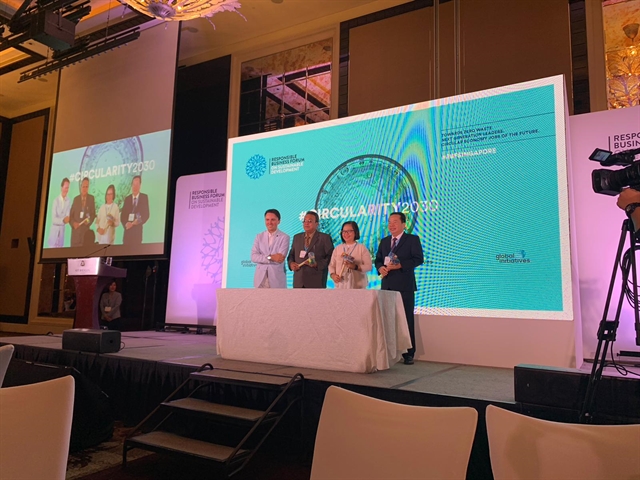 Environment
Environment

The World Wildlife Fund (WWF) is calling on cities in Southeast Asia to join Patong (Thailand), Donsol (Philippines) and Phú Quốc Islands (Việt Nam) in making a commitment to eliminate plastic pollution, by developing an action plan and trial innovative solutions.

|
| Representatives of Phú Quốc Island District, Việt Nam; Patong Municipality, Thailand and Donsol, Philippines, signing a Declaration of Intent into WWF’s Plastic Smart Cities programme on behalf of their cities at the Responsible Business Forum Singapore 2019. — Photo courtesy WWF |
SINGAPORE — The World Wildlife Fund (WWF) is calling on cities in Southeast Asia to join Patong (Thailand), Donsol (Philippines) and Phú Quốc Islands (Việt Nam) in making a commitment to eliminate plastic pollution, by developing an action plan and trial innovative solutions.
Plastic Smart Cities is a WWF initiative bringing together cities and tourism destinations to commit to fight plastic pollution. In just the last 12 months, WWF has fundraised US$40 million to work on circular economy projects in cities in Thailand, Việt Nam, Indonesia and the Philippines.
An estimated 60 per cent of plastic marine debris derives from urban centres is often carried to the ocean by rivers. While cities will rapidly increase their populace to account for two-thirds of the global population by 2050, they must urgently adopt smart solutions that reduce the collective impact of their prospering communities. This means preventing, minimising and managing plastic. Many good examples and initiatives are already underway; WWF seeks to accelerate these existing efforts by empowering cities around the world to become Plastic Smart.
At the Responsible Business Forum Singapore 2019, which was held on November 19, chairman of the People’s Committee of Phú Quốc Island District, Mai Văn Huỳnh; advisor to mayor of Patong Municipality, Thailand, Kumnung Sing-Eaim; and Mayor of Donsol, Philippines, Josephine Alcantara have signed the Declaration of Intent into WWF’s Plastic Smart Cities programme on behalf of their cities.
Through Plastic Smart Cities, WWF is building cities’ capacity to eliminate plastic pollution by 2030. An online knowledge platform with best practices will be launched at the World Urban Forum in February 2020.

|
| A green and clean ocean scene of a coastal area of Việt Nam. —VNS Photo Công Thành |
In the meantime, WWF is calling on Asian cities to sign-up and to start sharing best practices through www.plasticsmartcities.org. Today is the beginning of a long-term campaign to reduce plastic globally through sharing innovative, tried and tested solutions for those on the front line in the fight against plastic pollution. Mayors also call on governments to introduce a global, legally-binding agreements to stop plastics polluting our oceans.
Vincent Kneefel, Global Cities Lead, WWF said: “With eight million metric tons of plastic entering our oceans each year, mismanaged plastic waste is profoundly threatening people and the environment, especially rivers and oceans,” Vincent said.
“We are proud to launch Plastic Smart Cities today and are confident that through this initiative we can create a global movement of cities taking action to tackle plastic pollution and stop leakage into nature. Plastic Smart Cities will strengthen action when it comes to preventing, measuring, and managing plastic waste at a local level. Our goal is to promote best practices around the world and to make sure that smart measures on plastic reduction and waste management are widely shared. With strong commitments from cities, governments and industry, we can end additional plastics in nature and ensure the safety of our communities and the environment.”
According to key statistics on plastic pollution given by WWF, eight million tonnes of plastic pollution ends up in the ocean every year.
Overall carbon emissions from the plastic life cycle are expected to increase by 50 per cent, while the carbon increase from plastic incineration is set to triple by 2030, due to wrong waste management choices.
An additional 104 million metric tonnes of plastic is at risk of leakage into our ecosystems by 2030 without a drastic change in approach.
Since 2000, the world has produced as much plastic as all the preceding years combined, a third of which is leaked into nature.
More than 270 wildlife species have been documented as having been harmed by entanglement, while more than 240 species have been found to have ingested plastics, according to WWF. — VNS




